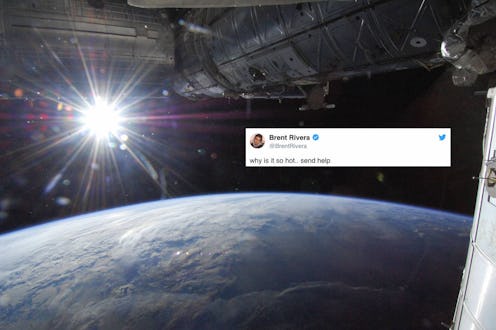Life
Surprise: The Earth Is Actually As Far Away From The Sun As It Can Get Right Now
Unfortunately for us, it doesn't matter how far from the sun we get: The Earth is still going to be hot as heck. On July 6, Earth was at aphelion, officially at its farthest from the sun, orbiting at a distance of 94,507,803 miles, as opposed to its usual 93 million miles, according to Space.com. But though at aphelion, Earth receives about 7 percent less sun than it does in January, the seasons and temperature don't actually have anything to do with our orbital distance, The New York Times reported.
Instead, seasons on Earth "are the product of changes in the amount of direct sunlight as the planet tilts toward and away from the sun," according to The New York Times. Our path around the sun doesn't change in distance enough for us to be affected by the distance — but there are other planets in our solar system that do see the effects, like Mars.
David Grinspoon, an astrobiologist at the Planetary Science Institute, told The New York Times it's a common misconception that Earth's orbital distance has anything to do with the swing of the seasons. And he finds it "amusing" that this misconception "is actually true if you are on Mars," he told The New York Times. That's because Mars has a whopping 31 percent difference in the amount of sunlight it gets at different distances, as opposed to our 7 percent.
"It's like toasting your marshmallow slowly from a safe distance above the campfire, then swooping in close for a nice quick char," Tanya Harrison, a planetary scientist at Arizona State University, told The New York Times. And though we may feel like we're toasting right now, our shift in temperatures is nothing compared to Mars', where, according to Space.com, a summer day "may get up to 70 degrees [Fahrenheit] near the equator, but at night the temperature can plummet to about minus 100 degrees." That could put a serious damper on dreams of moving to Mars for those of us who spend Earth's comparatively meagre seasonal temperature changes suffering through sinus headaches.
As for our increasing global temperatures and the fact that the past few years have been rife with wildfires (there's one burning in California right now, in fact), we can point to global warming, according to the Union of Concerned Scientists. In a statement posted on its website, the union asserted that the "effects of global warming on temperature, precipitation levels, and soil moisture are turning many of our forests into kindling during wilfire season."
The reason our increase in deadly wildfires can reliably be attributed to climate change is because many areas that have seen increases in wildfires "are protected from or relatively unafffected by human land-use and behaviors," the union wrote in its statement. "This suggests that climate change is a major factor driving the increase in wildfires."
According to the union, if we keep treating the Earth the way we have been, we can expect temperatures to continue to rise, and we can expect wildfire seasons "to lengthen, with the southwest's season of fire potential lengthening from seven months to all year long." On top of facing the prospect of a year-round wildfire threat, we'll have to contend with the strong possibility that "wildfires themselves are likely to be more severe," the union wrote.
Minimizing wildfires in the future will involve "creating buffer zones between human habitation and susceptible forests, and meeting home and city fire-safety standards," according to the union, but even more than that, if we want to keep global warming at bay, we as a society have to take significant steps to do so. The union's list of ways to reduce our impact on the Earth includes expanding the use of renewable energy, increasing vehicle efficiency and lowering our oil usage, and building a clean energy economy, among others.
If you're concerned about how human behavior has influenced this current heat wave, you can take action. Beyond individual behavior changes, such as reducing the plastic waste you produce, you can also call your representatives and demand action on climate change. Earth may be far from the sun, but it's still super hot, and, to put it bluntly, the sun isn't to blame — we are.
